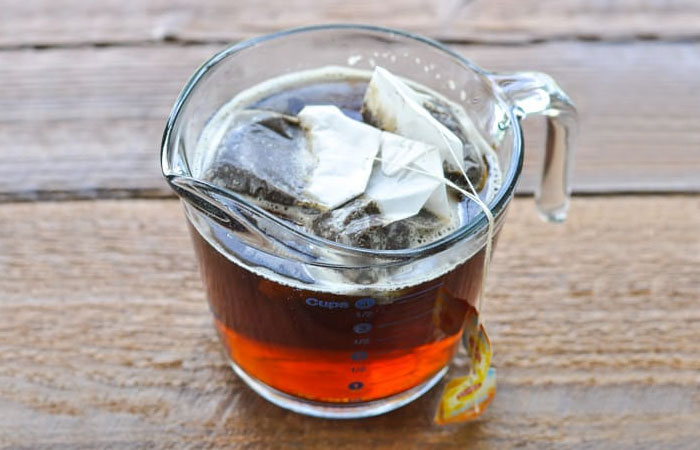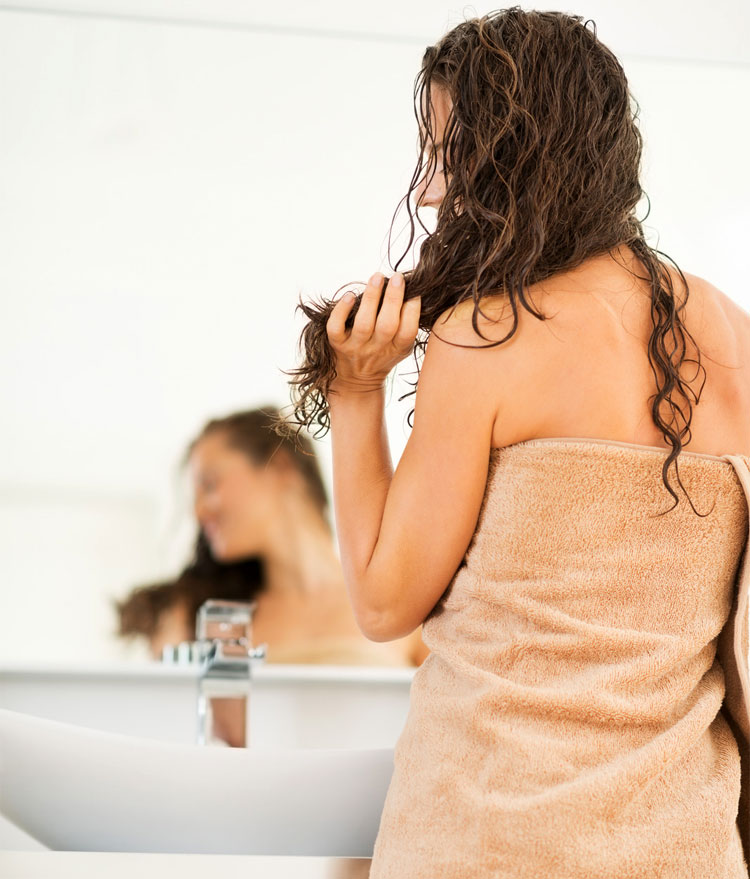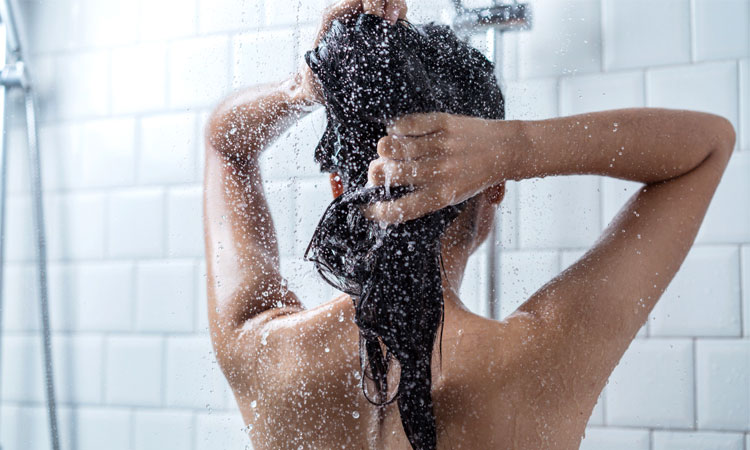The cup of tea that you drink each morning can do more than you may have thought possible. While black tea can certainly jumpstart your metabolism and wake you up for a busy day ahead, it can also breathe new life into your hair.
Before you dump your morning cup of tea directly on your head, learn more about what black tea can do for your locks and how you can best use it. Even if you’re a coffee drinker, you may want to continue reading to see how black tea can benefit your hair.
Table of Contents
What Makes Black Tea Good for Hair?
Some of the amazing properties of black tea that produce incredible physical benefits for your body are the same properties that benefit your hair.
- Tannins – These types of astringents are found plentifully in black tea and help to give this drink its dark color.
- Flavanols – These antioxidants are known to reduce age-related damage and oxidative stress.
- Caffeine – Promotes strong, healthy hair growth and suppresses the hair loss hormone DHT. Caffeine is in stronger supply in black tea than it is in other types of tea.
Black Tea Benefits for Hair
These three key components of black tea provide the following seven amazing benefits for your hair.
1. Improve Hair Growth
The primary reason that people turn to black tea to solve their hair woes is to improve hair growth. This effect is traced back to the caffeine in the tea that stimulates blood flow to the scalp.
As hair roots receive a better supply of oxygen and nutrient-rich blood, they naturally grow faster and more healthfully than ever before.
2. Decrease Hair Loss
In much the same way, black tea can also block loss of hair and reduce shedding. If you have noticed that more hair has been in your shower drain or your hair brush lately, regular black tea rinses can help solve this problem.\
Caffeine actually prevents DHT, which is a type of testosterone that causes hair loss, from affecting your hair follicles.
There’s good reason why many men are turning to caffeine infused shampoos like Alpecin C1 to help prevent hair loss and make their hair look fuller. While hair loss in women isn’t as prevalent, it does affect many and similar shampoos exist for women, like Plantur 39.
3. Darkens Hair
The tannins in black tea can help color your hair. Black tea is best used for hair coloring if you already have naturally dark hair. It has been known to cover over and blend in grays in a very natural way and to add a reddish tint to auburn hair.
You will love the natural-looking color that results without the use of any chemicals.
4. Softens Coarse Hair
A black tea rinse is a welcome alternative to the chemical-laden methods of softening and calming coarse, kinky or highly textured hair.
Related: 5 Signs of Hard Water on Hair
5. Creates Beautiful Shine
The tannins and caffeine in black tea also create a gorgeous luster for tired, overly styled hair. With regular rinses, you can step away from your straightener or curling iron and let your hair repair itself.
See Also: Straight vs Curl Hair
6. Stimulates Blood Flow in the Scalp
As already mentioned, the caffeine content in black tea stimulates the scalp, which not only improves hair growth but also can decrease dandruff and help create healthier-looking strands.
7. Creates Stronger Strands
These healthier strands will also be stronger than ever. Black tea rinses can be huge game changers if you have fragile hair that easily breaks or split ends that you have to keep trimming.
Now you will be able to let your hair grow as long as you want it to without having to worry that it will appear unkempt.
How to Use Black Tea on Hair
To get the best results from a black tea hair rinse, you will need to do a bit more than simply dump a cup of tea over your head. However, the rinse process is actually quite easy and does not take long to complete once you get used to the steps.
- It is best to begin with a weaker black tea brew as you determine how it will affect your hair. Purchasing any brand of black tea will do but Lipton and Newman’s Own are both good values.
- Start with only a couple of teabags steeped in two cups of water that has just come off the boil. Use a large Pyrex measure cup or a jar large enough to hold it. Once the tea has sufficiently cooled, it is ready to use or you may want to pour it in a clean spray bottle for application.
- In your shower, shampoo your hair as normal and fully rinse your hair.
- While still in the shower, pour (or spray) some of the black tea onto your hair and massage it in, section by section, making sure to let it reach all the strands. You may want to use a comb to pull it through all your strands.
- Once you have applied the tea, cover your hair with a shower cap to seal in the moisture and get out of the shower.
- Let it sit for 20 to 40 minutes and then go back to the shower and rinse the tea out with lukewarm water.
- There is no need to shampoo your hair again, but you will want to use conditioner on your hair immediately after to add moisture back into it following the moisture-stripping action of the tannins.
Once you have determined how the tea is working on your hair, you may want to make a stronger brew, using at least four teabags per two cups of water.
Another option is to let the teabags steep in cool water overnight. This method ensures that no nutrients from the tea are lost in the boiling water.
See Also: Shampoo First or Reverse Wash?
FAQ
Are there any drawbacks to using black tea?
While black tea is generally quite safe for your scalp and hair, you should know about a few things that could go wrong if you are not careful.
- First, always be sure to condition your hair after the tea rinse to restore moisture fully.
- Second, if you use black tea rinses more frequently than is recommended, you may actually find that the tea causes increased hair dryness rather than improved shine and strength.
- Third, it could stain your hair if you have blonde strands.
- Finally, it could irritate your scalp if you are allergic to black tea. This is why it is always important to start with a weak blend.
How often should you use a black tea rinse?
Determining how often you should perform your black tea hair rinse is very personal because each person’s tresses respond differently to this blend.
However, you will most likely experience good results from rinsing every 7 to 10 days initially for up to a couple months and then doing repeat rinses as needed when you notice that your hair needs a bit of extra love.
Can you use black tea to wash your hair?
Black tea should be used more as a post-shampoo rinse than as a cleansing agent. Always use it after shampooing and conditioning with your usual products.
Can you use other types of tea on your hair?
Black tea is not the only blend that you can use on your tresses for improved hair health. Nearly all types of tea produce positive results, and a different option may actually work better for you if you have a different type or color of hair.
For example, chamomile tea mixed with some natural lemon juice helps lighten blonde hair while rooibos tea provides added depth of color for redheads. Green tea may also be able to prevent hair loss, and oolong tea can soothe an itchy scalp.



